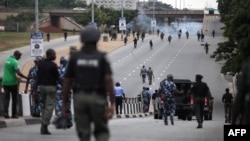Two religious sects in Nigeria have welcomed the U.S. placing Nigeria on a so-called blacklist for alleged religious freedom violations. Leaders of the Christian Association of Nigeria (CAN) and the Islamic Movement of Nigeria (IMN) say Nigerian authorities have unjustly targeted them for persecution. Nigerian authorities reject the allegations and describe the U.S. designation as an honest disagreement.
This week, U.S. Secretary of State Mike Pompeo designated Nigeria and nine other nations as “countries of concern” for engaging in what he called "systematic, ongoing, egregious violations of religious freedom."
The move paves the way for U.S. sanctions against Nigeria unless the country improves its religious freedom record.
Nigeria's minister of information and ministry of foreign affairs released statements rejecting the U.S. designation and said they would engage with U.S. authorities to see that it's reversed.
But religious groups like the Christian Association of Nigeria, or CAN, said the listing means the world is aware of developments in Nigeria.
Cletus Usman is a former financial secretary for CAN.
"It's a very clear thing that we do not have religious freedom. Christians don't have the religious freedom we're supposed to have in this country, if you look at what is happening," said Usman.
Usman's only son was murdered in 2001 during religious rioting between Christian and Muslim groups in northern Nigeria.
He says religious division and prosecution are the main reasons for violence in the region.
"When Boko Haram started, the first person they killed in Maiduguri was the CAN chairman, my good friend," said Usman. "They killed him, killed his wife and his two children. They started killing Christians, it’s now the thing spread to all human beings."
Another religious group, the Islamic Movement of Nigeria, or IMN, has also welcomed the U.S. designation.
For many years the group has demanded the release of its leader, held by Nigerian authorities for alleged insubordination.
The IMN also blames Nigerian authorities for a 2015 crackdown that killed more than 350 of its members.
Ibrahim Musa is the media chief for the IMN.
"We see it as a welcome development in the sense that at least the U.S. has recognized that we have been under perpetual injustice in Nigeria for the past five years and that we have been denied our religious rights," said Musa.
Nigeria maintains a delicate balance between two major religious groups, Christians and Muslims. Tensions between local communities has flared up at times, sparking clashes that left hundreds dead.
A spokesman for Nigeria’s ministry of foreign affairs noted the country’s constitution guarantees freedom of religion, including the right to change one’s religion or promote one's beliefs.
He said, “Religious liberty in Nigeria has never been in question” and insists any claim to the contrary is “completely false and untrue.”





